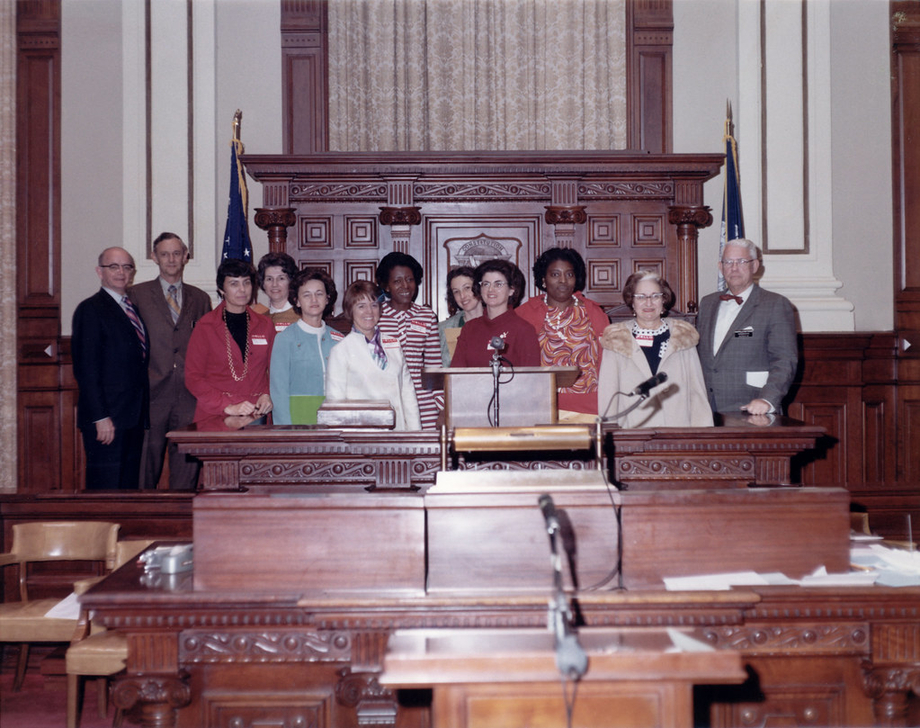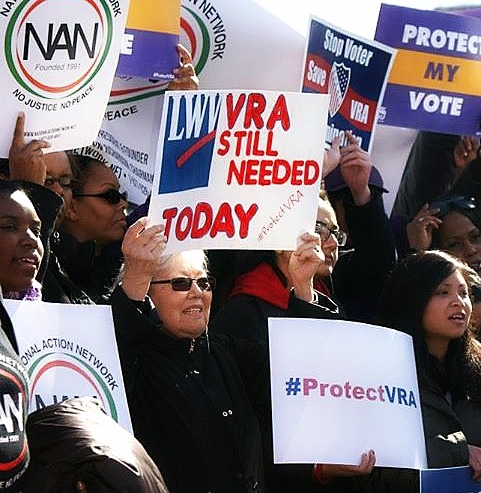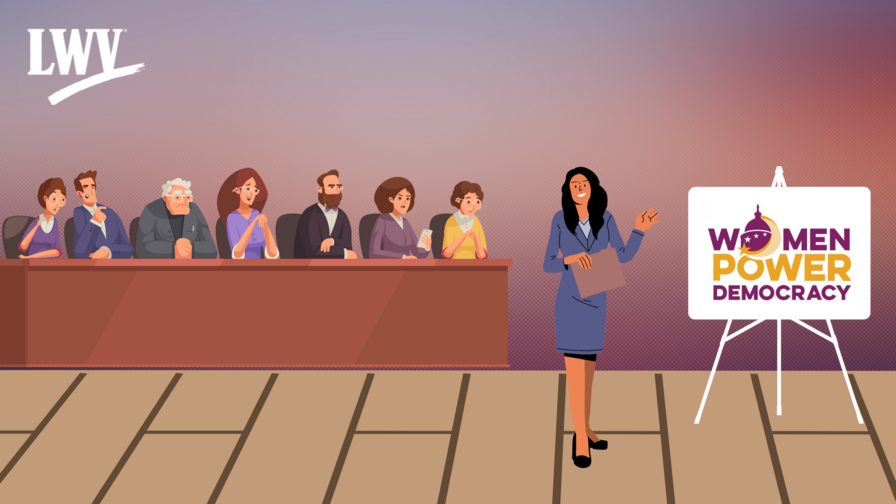Celebrating Women Who Pioneered Litigation at the League
In March 2023, LWV staff met with four women attorneys — Trudy Levy, Katherine Mazzaferri, Cynthia Hill, and Maureen Thornton Syracuse — who pioneered the League’s litigation work between the 1970s and 1990s. The goal was to learn about their experiences litigating alongside Leagues during those critical decades.
About the League's Litigation Department
The litigation department of the League of Women Voters Education Fund was established in 1973.
By 1975, the Ford Foundation funded a substantial litigation grant for the League of Women Voters Education Fund (LWVEF) as part of Ford’s ground-breaking initiative to launch the first public interest law firms. The grant supported litigation conducted by the litigation department and efforts to encourage Leagues to consider litigation as an advocacy tool. These were the early days of public interest law, and the League focused on equal access and rights.
Expanding Women’s Opportunities in the Workplace
Katherine Mazzaferri and Trudy Levy pioneered landmark litigation to open up opportunities for women nationwide in nontraditional jobs, most notably in the construction trades.

With Joan Graff of Equal Rights Advocates, they served as lead counsel in the case of Advocates for Women v. Marshall. Mazzaferri noted: “The challenge that the LWVEF initially sought to address was the reality that despite Title VII and Executive Order 11246, as amended, which required affirmative action by federal contractors, women were excluded from construction jobs and/or harassed and discriminated against after they were hired.” This case was groundbreaking in its long-lasting, nationwide impact. In furtherance of the litigation, the LWVEF pushed for regulations to establish goals and timetables for federal contractors and federally funded apprenticeship programs.
Following this successful litigation, Maureen Thornton Syracuse and Cynthia Hill partnered with Equal Rights Advocates to monitor compliance with its regulations. In 1980, the two organizations filed an administrative petition to prohibit maximum age limits in apprenticeship programs, which were barriers to women’s access to training in skills to succeed in those jobs.
During the seventies, Levy and Mazzaferri also worked as local counsel with the Women's Rights Project (WRP) on an initiative co-founded by then-attorney and law professor Ruth Bader Ginsburg on Owens v. Brown. This was a seminal case brought by lead counsel Jill Laurie Goodman, Susan Deller Ross, and Marjorie M. Smith centering on the question of enlisted women serving on Navy vessels.
Support our legal work!
By donating, you'll power LWV's litigation efforts.
The decision, authored by Judge John Sirica, struck down a federal statute prohibiting women from serving on Navy vessels. Judge Sirica found that the law the Navy was using to limit the assignments of women violated the equal protection guarantee in the 14th Amendment. At that time, 25,000 women were serving in the Navy.
Supporting the Right to Vote
Moving into the eighties, the litigation department also focused on voting rights, affirmative action, and employment discrimination.
Hill and Syracuse worked with the LWVUS and state and local Leagues in monitoring, filing comments to the Justice Department, and providing testimony to Congress on enforcement of the Voting Rights Act (VRA). According to Hill, “These efforts were especially crucial in the early to mid-1980s due to the 1982 extension of the VRA, reapportionment, and redistricting after the 1980 census, and proposed revisions by the Department of Justice to VRA Section 5 procedures to cover new bailout procedures.” The Leagues and other organizations achieved meaningful changes to the proposed procedures.

Unfortunately, the United States Supreme Court 2013 decision in Shelby County v. Holder invalidated the VRA's Section 4(b) coverage provisions, effectively gutting enforcement of Section 5. In light of this hit to voting equity, it is important to remember the League’s past experiences in protecting voting rights and use them as inspiration for the present.
Litigation staff also worked with state and local Leagues through the 1970s and 1980s, conducting regional workshops on working with lawyers and distributing educational materials. One of the major LWVEF publications funded by the Ford grant, Going to Court in the Public Interest, outlined the need for organizations to engage in litigation to make a change. It was shared widely with local and state Leagues and the public.
In some cases, both LWVEF and state Leagues filed briefs. In Galbraith v. Celeste, in the Franklin County Court of Common Pleas, the Ohio League and the LWVEF litigation department filed amicus briefs arguing that election officials had an affirmative duty to facilitate voter registration. The ACLU of Ohio Foundation joined the Ohio League, while the LWVEF brief included LWVUS and other national organizations to support the state amici.
LWV Litigation Now
In recent years, LWVEF and state Leagues have engaged in hundreds of cases dealing with voting rights, voter registration, health care, climate change, and gun safety. The League of Women Voters of the United States has just created a Legal Center where you can find national, state, and local litigation.
Recent cases include:
- LWVNC v. Rucho, which challenged North Carolina’s 2016 redistricting plan as an unconstitutional partisan gerrymander and a violation of the First and Fourteenth Amendments;
- Moore v. Harper, in which the LWVUS and Leagues from all 50 states and the District of Columbia filed an amicus brief before the Supreme Court. Moore v. Harper concerns the so-called “independent state legislature theory” (ISLT), which, if adopted, would have far-reaching implications for the future of American democracy; and
- Dobbs v. Jackson Women’s Health Organization, the 2022 Supreme Court decision that overturned Roe v. Wade and Planned Parenthood v. Casey and ended the federal constitutional right to abortion.
As we move forward in the courts, it is gratifying to look back at the early days of League litigation and hear from the women who worked to establish the League’s litigation work that still exists today.
The Latest from the League
The new Legal Center on LWV.org showcases historic and active litigation where the League is fighting for voters' rights and civil rights in courts around the country.
March 26th marks the anniversary of the landmark Rucho v. League of Women Voters of North Carolina (also known as Rucho v. Common Cause) Supreme Court oral arguments. The Supreme Court's ultimate decision, that federal courts cannot make determinations on partisan gerrymandering, would have major consequences for representation across our democracy.
We spoke with Allison Riggs, who was chosen to represent the plaintiffs and argued the case before the Supreme Court. Now, Riggs, who is now co-executive director and chief counsel for the Southern Coalition for Social Justice, gives us her first-hand account of what happened in the courts.
LWV of the United States and League chapters from all 50 states and DC filed an amicus brief in the Moore v. Harper case before the Supreme Court. The case concerns the so-called “independent state legislature theory” (ISLT), which, if adopted, would have far-reaching implications for the future of American democracy.
Sign Up For Email
Keep up with the League. Receive emails to your inbox!
Donate to support our work
to empower voters and defend democracy.





